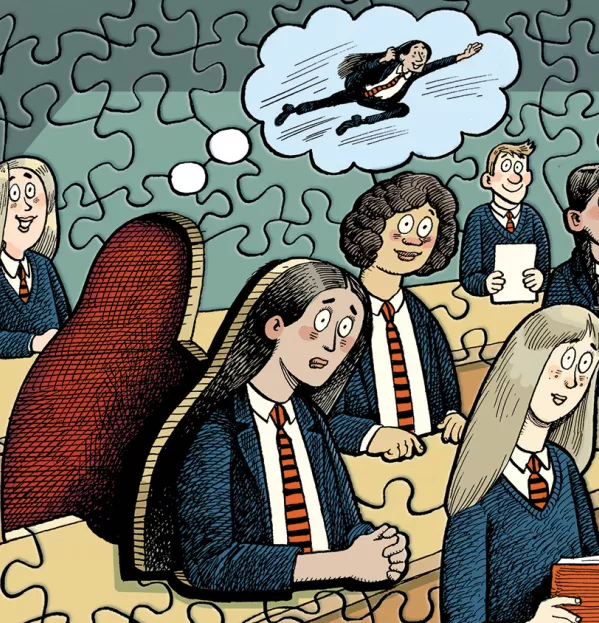We can make wonder women, not worriers

Late last year, research published by the Girl Guides suggested that girls as young as 8 are feeling the pressure of gender stereotyping. Amid much commentary on the “mental health crisis” besetting young people, girls in particular, alarming headlines accompanied the publication of the Millennium Cohort Study (researched by the University of Liverpool).
As a head, I am often asked why there is such a worrying decline in the mental health of young people and I do my best to answer. I talk about the impact of the commercialisation of childhood; exam pressure, inflated by league tables; of economic gloom and the perceived impossibility of ever being able to realise adult aspirations; the omnipresent digital landscape with its relentless messaging about various forms of unattainable perfection; of crazily late nights and reduced sleep from poring over Snapchat; of the overprotective adult generation, which has worked so hard to contain the recklessness of youth that it has unwittingly taught children to be fearful and timid rather than independent and self-assured.
All of these things and probably a whole lot more feed into the problem; there are many people better qualified than I am to speculate on them. What I can do, though, is talk with great certainty and with my whole heart about the things we can (and do) do in our schools to enhance wellbeing, and to keep our girls engaged and truly grounded in their work and play. Things that don’t necessarily cost a penny.
Happiness and confidence
There are two key ideas that seem to matter most in helping to develop the happiness and confident achievement of our young people. Firstly, it’s about belonging. And I don’t mean this as a weak, sentimental cliché. More than ever, perhaps, our teens need to feel that they belong to something bigger than themselves and their social media echo chambers. They need to feel that they are part of something that matters and has a sense of continuity, value and resonance far beyond a knowledge of Kim Kardashian West’s latest baby.
In the past, that need might have been filled by the church or by the local community, by the family or even by an accepted collective sense of nationhood. And I know that many young people of whatever faith are lucky enough to still find solace and identity through some or all of these things. But this is not invariably or universally the case now. And that is where schools come in.
Schools can fill a vacuum if and where there is one. No matter what or where the school, every child in it belongs to something larger than themselves. They are part of a joint, collective enterprise full of the energy, imagination, beliefs and expertise of large numbers of people who broadly care about stuff that really matters: learning, their subjects, the development and wellbeing of other people. And that is hugely powerful and inspiring.
Their school connects children with the past - to the generations that have come through the school gates before them - and to the future: all those who will follow after them. And every school has its own story, which it will be telling in its own way. This matters and is one important ingredient in our bid to help our children make sense of the world and their part in it. They will find themselves by looking beyond themselves. And that’s an important skill for teenagers to learn.
Wonders will never cease
The second key thing is wonder. One of our school aims - perhaps the one that resonates most strongly with me - is our bid to nurture scholarship, curiosity and a sense of wonder. That idea - the delight and satisfaction and joy from the process of questioning, exploring, discovering - feels absolutely central.
Of course, wonder can come in many forms. It may arise from finally unpicking a torturously challenging maths question or suddenly spotting something beautiful in a line of poetry, or from asking something crazy in a science lesson and finding out the astonishing answer. It could be from playing your violin in the third row of the school orchestra and finding that collectively you are making an incredible sound. Or from finally nailing a move on the football pitch. Or finding that you had a powerful voice in a debate, or as an actor or a stand-up comedian. It could even be from simply looking afresh at the playground with your mates and being glad that the sun is shining briefly on your school.
It doesn’t much matter what it is, but it does matter that we work hard to develop it. Not least because that is what makes working in schools such enormous fun for us all.
So, schools as a place full of collective wondering…that’s what we need to be offering, that’s where power is. As Edgar Allan Poe pointed out: “It is a happiness to wonder; it is a happiness to dream.”
Perhaps that’s as good a response as any to the malaise of our times.
Jane Lunnon is head of Wimbledon High School
You need a Tes subscription to read this article
Subscribe now to read this article and get other subscriber-only content:
- Unlimited access to all Tes magazine content
- Exclusive subscriber-only stories
- Award-winning email newsletters
Already a subscriber? Log in
You need a subscription to read this article
Subscribe now to read this article and get other subscriber-only content, including:
- Unlimited access to all Tes magazine content
- Exclusive subscriber-only stories
- Award-winning email newsletters